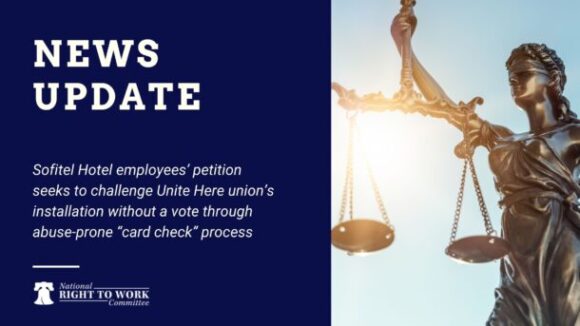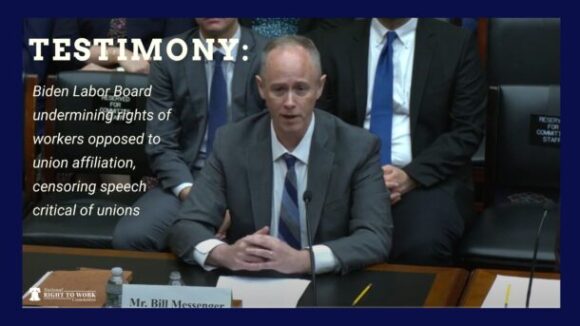Foundation Fires Back Against Biden NLRB ‘Card Check’ Mandate
Brief challenges Labor Board’s attempt to expand coercive, anti-employee organizing scheme
The secret ballot provisions in the Card Check Forced Unionism bill are a “trojan horse” for more onerous, burdensome and coersive measures contained in the legislation, according to the National Review:
In its original form, the mendaciously misnamed and thoroughly anti-democratic Employee Free Choice Act would strip American workers of the right to conduct secret-ballot elections on the question of whether to organize a union. In place of a traditional one-man/one-vote secret ballot, the EFCA would impose a regime of union-boss thuggery known as “card-check,” wherein labor organizers (who may also be the employees’ supervisors) pressure workers to sign off on a union-organizing petition, a much easier way to reach a serviceable majority. Democrats have now signaled their willingness to remove the card-check provision from EFCA but, as in the case of the cap-and-trade legislation, the marquee proposal is only one poison arrow in a quiver full of venom. With or without card-check, EFCA is a bare-knuckles power play by Big Labor and the Obama administration — a bill that needs killing.
The name of the legislation is straight out of Orwell, but the content is pure Kafka. The worst provision — worse, in fact, than the card-check gambit itself — would allow the National Labor Relations Board to impose contracts on businesses that cannot come to an agreement with a union. If a union enters the picture and the owners of a business are unable to negotiate a satisfactory contract, then the NLRB is empowered to impose “binding arbitration,” meaning that the government will write the contract and force the firm to abide by its terms. This amounts to extortion. President Obama has picked a like-minded lawyer culled from the ranks of the Teamsters to chair the NLRB, and another Obama NLRB pick, Craig Becker, is a labor radical who wrote that “federal policy should not acknowledge employees’ ‘choice to remain unrepresented.’” Given that these are the people who will be making the calls, businesses find themselves in a double-bind: They are at a disadvantage when negotiating with union bosses because the unions have every reason to believe that arbitration will be handled by one of their own. So business owners are left either to negotiate with the unions from a position of weakness or to throw themselves on the mercy of the union-dominated NLRB. Heads the Teamsters win, tails the Teamsters don’t lose.
“This bill will bring about dramatic changes, even if card check has fallen away,” said one AFL-CIO honcho to the New York Times. Indeed it would. In addition to empowering government to force contracts on private parties, EFCA would mandate that businesses give union organizers access to their property and would restrict businesses’ ability to argue against union-organizing proposals. The organizing-campaign period would be shortened, thereby curtailing debate, and business owners would be prohibited from holding mandatory meetings to discuss union-organizing proposals with their employees. Which is to say, businesses will be forced to open their doors to union organizers, but will not be able to make the case against them on their own property. This is perverse, especially in a country whose constitution is alleged to protect citizens’ freedom of association, not to mention their property rights.
Big Labor, especially the Service Employees International Union (SEIU), owns the Obama administration and the Democrats’ congressional majority. SEIU alone gave in excess of $80 million to Democratic candidates in the last cycle and was the Democrats’ largest single donor. EFCA already contains a good deal of labor’s legislative wish list and is sure to acquire more of it as it wends through the legislative process. Ex-Republican Arlen Specter, nominally a Democrat but really representing a party of one, was a critical player in stopping EFCA during its last push. Senators Ben Nelson and Blanche Lincoln have been key Democratic opponents, but their commitment is less than adamantine. If EFCA passes, the decisive vote may end up coming from the newly installed senator from Minnesota, Al Franken, the first of many pranks this joker is likely to pull on us.
Republicans don’t have the numbers to stop this bill on their own. But it is a bad bill nonetheless, and those in Congress who would resist the further regimentation of American economic life have a responsibility to oppose it, loud and long.
Brief challenges Labor Board’s attempt to expand coercive, anti-employee organizing scheme

Sofitel Hotel employees’ petition seeks to challenge Unite Here union’s installation without a vote through abuse-prone “card check” process

Testimony: Biden Labor Board undermining rights of workers opposed to union affiliation, censoring speech critical of unions